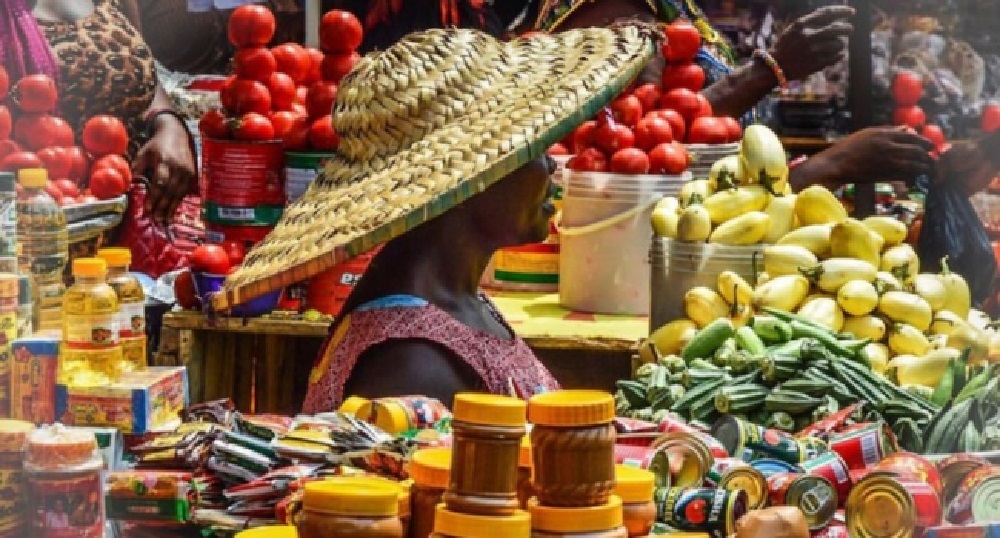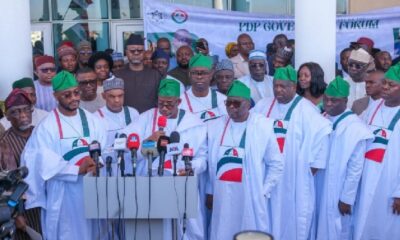Economy
Why 1,000 workers left CBN – Cardoso

The Central Bank of Nigeria has again clarified that the 1,000 staff members who opted out of service in December 2024 were not forced to quit their jobs.
The CBN Governor, Olayemi Cardoso, stated this on Friday in Abuja at an investigative hearing of the House of Representatives’ ad-hoc committee probing the circumstances leading to the exit of the staff members and how the sum of N50bn severance package for the affected persons was arrived at.
Cardoso added that the affected persons opted to disengage through the voluntary Early Exit Program with payment of full benefits.
Represented by Deputy Director, Corporate Service of the CBN, Bala Bello, Cardoso explained. “The Early Exit Program, Restructuring and Re-organization “are basically ways and means through which the performance of an organization is optimized by ensuring that round pegs are put in right holes. The manpower requirement of the bank is actually met.
“I’m very happy to mention that the early exit program of the CBN is 100 per cent voluntary. It’s not mandatory. Nobody has been asked to leave, and nobody has been forced to leave. It’s a completely voluntary programme that has been put in place.”
He also noted that the exercise was not restricted to government agencies alone, saying, “I believe several organisations across the world, and even within this country, both in terms of the private sector and the public sector, are undertaking similar exercises.”
Continuing, Cardoso said, “In the past, we had instances in which cases of stagnation and lack of career progression appear. In an organisation, you’ve got a pyramid where from each level to the next level, the gap keeps narrowing. If not, you are going to have a quasi-organisation, an inverted pyramid.
“It gets to the level where you have, for example, 30 departments in the Central Bank. You cannot have 60 directors manning 30 departments. It’s not going to work.
“Once those vacancies are filled, it gets to a level where some people, even though they are very qualified, able, and willing, but the vacancies are not there. And then they got to a level where they are stagnated for a period of time.”
Speaking earlier, the chairman of the committee, Bello Kumo, noted that the committee’s responsibility was to submit the report to the House.
Economy
Inflation surged to 24.23% due to escalating cost of living

Inflationary pressure has reappeared as Nigerians grapple with increases in average costs of basic food items and energy.
For the first time after the rebasing of the Consumer Price Index (CPI), headline inflation spiked in March to 24.23 per cent – 105 basis points above the 23.18 per cent recorded in the previous month.
The National Bureau of Statistics (NBS) yesterday indicated that the rate of increase in the average price level was higher in March than the level in February.
In January, the NBS updated the weight and price reference periods in calculation of the CPI to make the inflationary gauge more reflective of changes in consumption patterns and the economy generally.
The rebasing did not only brought the base year closer to the current period from 2009 to 2024, it also introduced some critical methodology changes to improve the computation processes.
After the rebasing, inflation dropped from 34.80 per cent in the pre-rebased period of December 2024 to 24.48 per cent in January 2025. It dropped further to 23.18 per cent in February.
In its latest report, NBS recorded 186 basis points changes between the monthly inflation rate, with the month-on-month rate rising from 2.04 per cent in February to 3.90 per cent in March.
The NBS attributed the spike to the rise in costs of food and alcoholic beverages, fuels and electricity, among other items.
Analysts at CardinalStone said the resurgence was due to renewed foreign exchange (forex) pressures amid heightened global risk-off sentiment.
They pointed at foreign portfolio investments (FPIs) outflows and increased dollar demand, which saw naira dropping by 2.4 per cent in March.
Experts also cited increase in price of Premium Motor Spirit (PMS) or petrol, following the temporary suspension of the naira-for-crude swap arrangement.
Food inflation rate stood at 21.79 per cent in March 2025. The composite food index decreased to 21.79 per cent from 23.51 per cent.
Core inflation, which excludes volatile agricultural produce prices and energy, rose to 24.43 per cent from 23.01 per cent.
Specifically, the month-on-month food inflation rose by 50 basis points from 1.67 per cent in February to 2.18 per cent in March.
The NBS attributed the increase in food inflation to increases in the average prices of basic food items including ginger, garri, broken rice, honey, crabs, potatoes, plantain flour, periwinkle and pepper amongst others.
On a state-by-state basis, food inflation was higher in Oyo with 34.41 per cent; Kaduna (31.14 per cent) and Kebbi (30.85 per cent).
On the other side, the 9.61 per cent recorded by Bayelsa; Adamawa (12.41 per cent) and Akwa Ibom (12.60 per cent), were the lowest inflation rates.
Analysts expressed concerns that the resurgent inflationary pressure might lead to renewed tightening stance by the Central Bank of Nigeria (CBN).
CBN Governor Dr. Olayemi Cardoso, had at the end of the first Monetary Policy Committee (MPC) meeting in 2025, reiterated the apex bank’s commitment to orthodox monetary policies, noting that the apex bank’s stance will be reflective of the inflationary trend.
With inflation rate dropping in February, the MPC had decided to maintain all key monetary policy parameters, including the Monetary Policy Rate (MPR) at 27.50 per cent, the asymmetric corridor around the MPR at +500/-100 basis points, the Cash Reserve Ratio (CRR) at 50.00 per cent for Deposit Money Banks and 16.00 per cent for Merchant Banks, and the Liquidity Ratio at 30.00 per cent.
Clarifying the impact of the rebased CPI, Cardoso had explained that the lower inflation figure should not be misinterpreted.
He underlined the need to analyse more data before drawing comparisons, noting that the CBN is currently assessing the figures and will provide further guidance in due course.
The CBN boss stressed the critical importance of collaboration between monetary and fiscal authorities in sustaining recent economic improvements.
Addressing concerns about the impact of elevated borrowing costs on economic growth, the CBN governor assured that the apex bank’s primary objective is to stabilize the foreign exchange and financial markets.
He expressed confidence that such stability would attract increased foreign investments, stimulating the much-needed economic growth.
Cardoso also highlighted the competitiveness of the Nigerian currency, which has spurred growing interest from international investors.
Economy
SEE Current Black Market Dollar (USD) To Naira (NGN) Exchange Rate

The exchange rate between the US dollar and the Nigerian naira continues to draw significant attention from individuals and businesses alike, especially those involved in international trade and remittances.
On Saturday, April 12, 2025, activity in the Lagos parallel market, commonly known as the black market shows that the buying rate for one US dollar stands at ₦1570, while the selling rate is ₦1575.
These figures are sourced from traders and Bureau De Change (BDC) operators who are active in key currency exchange hubs across Lagos.
Why the Black Market Rate Matters
Although the Central Bank of Nigeria (CBN) does not officially recognize or support the use of the black market for foreign exchange transactions, many Nigerians still rely on it due to difficulties in accessing forex through official banking channels. Issues such as limited availability, long processing times, and strict documentation requirements have made the black market a more accessible, albeit riskier, alternative.
CBN’s Official Position
The CBN continues to warn against participating in parallel market trading, stating that such activities undermine the stability of the national currency. The apex bank urges those in need of foreign currency to apply through authorized financial institutions, which are mandated to follow official exchange rates.
Nonetheless, the disparity between the official and unofficial markets persists, often influenced by market forces such as demand, inflation, and fluctuations in Nigeria’s foreign reserves.
Latest Exchange Rates Overview
Black Market (Parallel Market) Rate
Currency Pair Buying Rate Selling Rate
USD/NGN ₦1570 ₦1575
CBN Official Rate
Currency Pair Highest Rate Lowest Rate
USD/NGN ₦1630 ₦1570
Key Notes for Forex Users
The exchange rates in the black market often differ slightly from one location or dealer to another due to market volatility and negotiation margins.
Rates can also fluctuate within hours based on economic news, government policies, and global financial trends.
It is advisable to compare rates from multiple sources before conducting any large transactions, especially in volatile markets.
What This Means for Nigerians
The current forex rates reflect continued pressure on the naira, and many analysts believe that inflation, reduced oil revenue, and inconsistent monetary policies are key factors driving the demand for the dollar. For everyday Nigerians, this means the cost of imported goods remains high, and businesses dependent on international suppliers face growing challenges.
Until forex supply stabilizes through official channels, the black market will likely remain a major player in Nigeria’s currency landscape.
Economy
CHECK Exchange Rate As Naira Weakens More In Parallel Market

Naira has continued its downward slide in the parallel market on Thursday, exchanging at N1,621/$1, a depreciation from N1,580/$1 recorded just a day earlier on Wednesday.
This represents a N41 decline in 24 hours, deepening concerns among traders and economic watchers about sustained volatility in the FX market.
While the official exchange rate stood at N1,644.00/$1 on Wednesday, according to figures published on the Central Bank of Nigeria (CBN) website, there was no updated official rate published by the CBN several hours after the market close on Thursday.
Meanwhile, market participants at Wuse Zone 4 in Abuja attributed the persistent depreciation to a resurgence in speculative activities, unmet demand from importers, and lingering confidence issues in the foreign exchange market.
Alhaji Aminu Gwadabe, President of the Association of Bureau De Change Operators of Nigeria (ABCON), attributed the ongoing volatility in the forex market to a mix of local and global uncertainties. In a message sent to Nairametrics, he stated:
“The volatility, fears, happenings, and shocks in both the local and international markets called for disdain.
President Trump’s tariff announcements have sent markets into panic, loss of confidence, revenue losses, and budget reviews.”
He added that despite ongoing interventions by the CBN, instability persists.
“As usual, the CBN, being a catalytic actor, must continue to ensure stability through timely interventions. However, volatility remains a challenge and needs to be more comprehensively addressed,” Gwadabe said.
He further called for an expanded policy transmission mechanism to better serve the retail end of the FX market.
“It is therefore necessary for the CBN to reevaluate the efficacy of that Policy transmission mechanisms and expand its scope to the BDCs retail segment of the market to cater for the needs of the critical retail needs of invisible transactions where the BDCs pose the most potent tool of the CBN policy transmission mechanism.”
Dr. Muda Yusuf, CEO of the Centre for the Promotion of Private Enterprise (CPPE), also linked the naira’s recent struggles to global developments and speculative pressures.
“This is not unconnected to recent policy signals from President Trump and global oil price movements. The market is heavily information-driven, and speculative pressure has spiked following the tariff announcements,” Yusuf explained.
“Now that Trump appears to be having second thoughts, we might even see a bit of a breather in the FX market,” he added.
Meanwhile, traders on the ground say the situation is being worsened by the uncertainty surrounding ongoing government reforms and inconsistent access to official FX windows.
“The demand today was unusually high, especially from small businesses that can’t access the banks. It’s putting pressure on our supply,” a trader at Abuja’s Wuse Zone 4, who asked not to be named stated.
The spread between the official exchange rate of N1,644/$1 and the parallel market rate of N1,621/$1 narrowed slightly on Thursday, a sign that some convergence may be taking place, despite persistent volatility.
Market analysts warn that unless the CBN resumes consistent interventions or significantly boosts FX liquidity, the naira may continue to face downward pressure in the weeks ahead
The continued slide of the naira, despite heightened CBN interventions, signals persistent challenges in Nigeria’s FX liquidity and structural demand-supply mismatch.
-

 News21 hours ago
News21 hours agoEmergency Rule: Punch Editorial went overboard – CRP
-

 News9 hours ago
News9 hours agoPDP governors declare support for Tinubu
-

 News13 hours ago
News13 hours agoEx-finance minister rearrested in new fraud probe
-

 News10 hours ago
News10 hours agoHope for Nigerians as Dangote refinery slashes petrol price again
-

 News21 hours ago
News21 hours agoJust in: Rivers Administrator summons, suspended Gov, deputy
-

 News21 hours ago
News21 hours agoCBEX Staff Arrested After Trading Platform Collapse
-

 News12 hours ago
News12 hours agoFubara: How can I forgive somebody who never requested for it– Wike
-

 News14 hours ago
News14 hours agoAlleged Se3ual Harassment: Natasha Declines Out-Of-Court Settlement Proposal By Akpabio’s Counsel


















